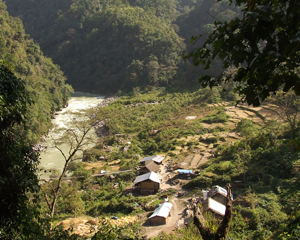Water Power. Discourses on Modernity and Development around the Nepalese Arun-3 Hydropower Project
Responsible for the doctoral project: Dr. Matthäus Rest (doctoral thesis 2014)
Funded by: Humer-Foundation for Academic Talent
Project duration: September 2009 – August 2012
Doctoral committee: Prof. Dr. Shalini Randeria, Graduate Institute of International and Development Studies; Prof. Dr. Ulrike Müller-Böker, Department of Geography/URPP Asia and Europe; Prof. Dr. Martin Gaenszle, University of Vienna
Research Field: Norms and Social Order(s)
Abstract

The construction of the Arun-3 Hydroelectric Plant has been surrounded by more than 30 years of controversy on local, national as well as transnational level. By focusing on these discourses the PhD project will contribute to the ongoing discussions on development and modernity. The social scientific literature on hydropower has been predominantly concerned with local communities and their strategies of resistance against dams as well as their interaction with transnational civil society networks and institutions such as the World Bank. In these discussions the Arun-3 project gained prominence in the 1990s when it was rejected by the Inspection Panel of the World Bank. While the decision to withdraw from the project was cited as example of successful local resistance, the majority of local people in the Upper Arun valley were in fact disappointed by the ensuing building freeze as they had hoped to benefit from employment, the access road and the electrification of their villages.
After the end of the subsequent civil war between the Maoist movement and the state and the parallel economic rise of Nepal‘s neighbors China and India we can now witness an increased geo-political interest in Nepal and its strategic water resources. The government of Nepal announced the resumption of Arun-3 by the Indian state-owned SJVN in 2008, adding yet another line of conflict to the multi-layered discourse space by allocating nearly 80 per cent of the generated energy to the foreign investor. In a multi-sited ethnography the dissertation aims at tracing the decisive discourses that emerged in the twisted history of Arun-3. Apart from analyzing the national and transnational media discourses, the narratives of activists and experts and the reports by the World Bank and other transnational donors for their understanding of development, the research will record local imaginations of modernity and expectations for development thus contributing to an understanding of anthropology as a history of the present by providing a multi-layered account of the multiplicity of modernities involved.